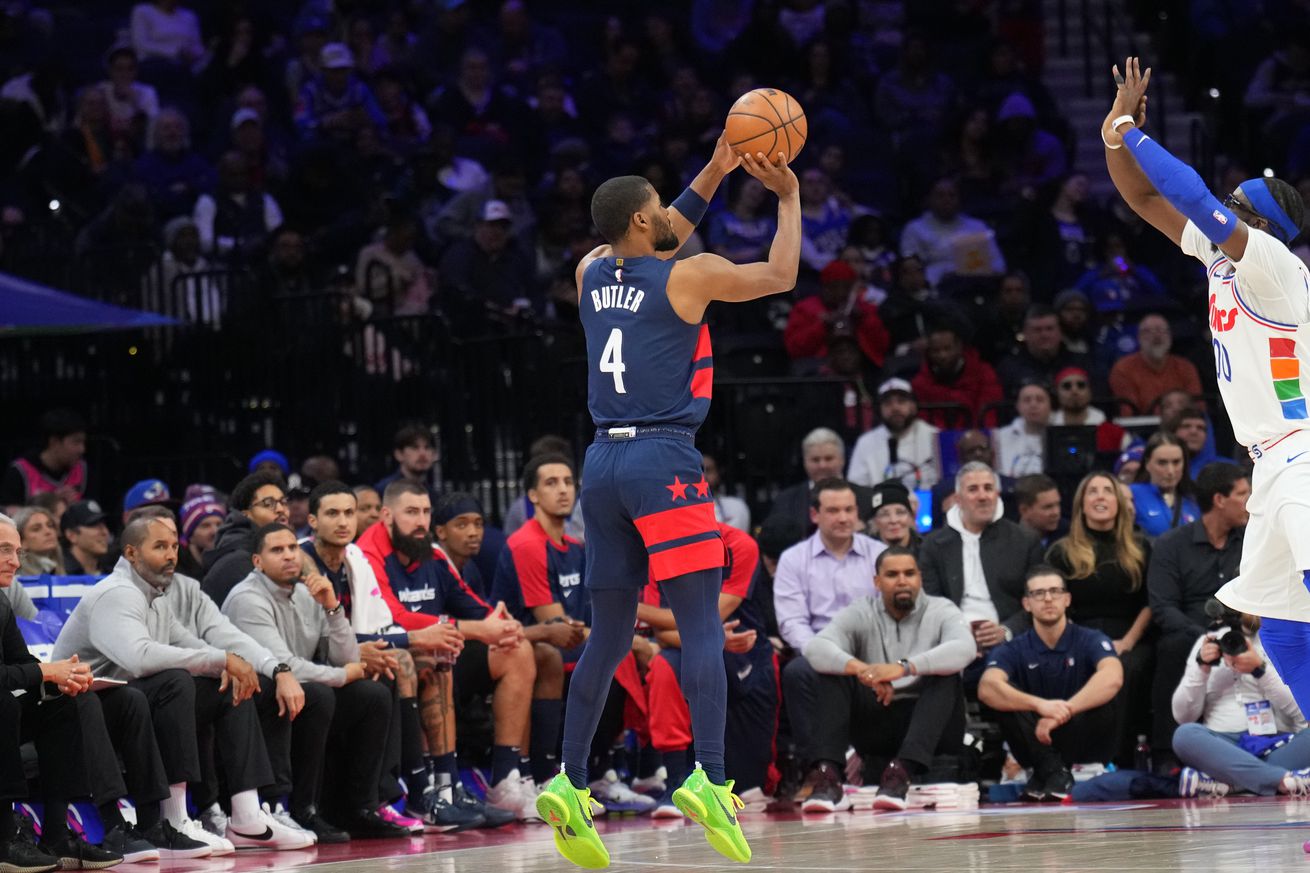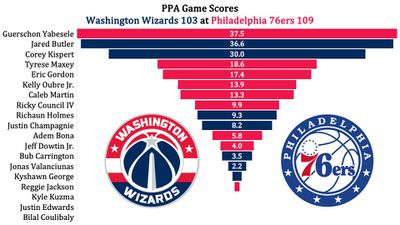
Stats, analysis, commentary.
What to make of this one? The Wizards fell behind early to a Philadelphia 76ers team missing an array of key players, including Joel Embiid and Paul George, got down by as much as 16, only to stage a fourth quarter comeback that saw them leading by two with 1:18 to play, only to have Philadelphia stage a comeback of their own and win by six. Got all that? There might be a quiz.
The mention of Sixers injuries was not intended as a slur on the Wizards. They have their own injury issues — last night, they played without Alex Sarr, Jordan Poole, and Malcolm Brogdon. Kyle Kuzma was back in action after missing the second half the day before with a calf contusion. Bub Carrington played with a sore back.
The game was an entertaining romp despite the absence of “star power,” in part because of all the next-man-upping. French big man Guerschon Yabesele started in place of Embiid and lit the Wizards up for 21 points (on 11 shots), 8 rebounds, 3 assists, and 2 blocks — one of which was on a driving layup attempt by Bilal Coulibaly, which would have tied the game with 14 seconds left in regulation.
Yes, Coulibaly should have dunked that.
Yes, if Coulibaly wasn’t going to dunk it, he should have used his left hand.
Yes, even disappointed with the outcome of that play, it was still entertaining to see Yabusele’s joy in besting his countryman.
The Wizards had some up-steppers, as well — Jared Butler played the best game of his young career, and Richaun Holmes peeled off the dust cloths to provide some inside oomph.
Bright spots?
- Butler was sensational. He scored a career high 26 points on 11-19 shooting, including 3-3 from three-point range. He added 4 rebounds and 7 assists to just 1 turnover. He did all that in 20 minutes of action. He finished the game with a 148 offensive rating (points produced per possession x 100) on 43.5% usage.
- By the way, Butler became just the 47th player in NBA history to score 26 or more points in 20 or fewer minutes (he played 20 minutes and 6 seconds). No one has done it twice. The first to do it was Tom Heinsohn for the Boston Celtics in 1958. Other notables on the list: Dolph Schayes, Sam Jones, Jack Twyman, Gus Williams, Rick Barry, Andrew Toney, Dale Ellis, Kiki Vandeweghe, James Worthy, Isaiah Thomas, Kevin Durant, Antony Davis, Joel Embiid, Jonas Valanciunas, Giannis Antetokounmpo, Jaren Jackson Jr., Victor Wembanyama. Buddy Hield is the only player to do it this season.
- Corey Kispert made shots — 23 points on 8-14 shooting and 4-8 from three — and contributed 5 rebounds and 5 assists. Strong game.
- Richaun Holmes got away with a goaltend late, and he didn’t score a lot. And while I hesitate to give him too much credit, it’s worth noting that Philadelphia had a tough time scoring when he was in the game.
- Justin Champagnie made efficient use of his few offensive opportunities (192 offensive rating on 7.8% usage) and he defended effectively.
On the not-so-bright (dim?) side…
- Coulibaly took 8 shots to score 5 points, and he didn’t make up for the subpar scoring game with rebounding, playmaking or stellar defense.
- Kuzma was atrocious. He forced wild shots (which he missed) and seemed generally oblivious to relevant things such as game situation, defenders, and the relative openness of teammates. He took 19 shots to score 16 points, managed just five rebounds in 31 minutes, and committed three turnovers to two assists. The Wizards were -22 in his time on the floor, and they actually played reasonably decent defense when he was out there.
- Kyshawn George’s shooting slump continues — 1-6 from the floor and 1-4 from three-point range. For the season, he’s shooting 24.0% on threes.
- Jonas Valanciunas had 14 points and 14 rebounds — 8 of which were offensive boards. He also committed eight turnovers — a new career high for him.
- No Wizards starter had an offensive rating that cracked 100. League average is 113.2. Yikes.
Of note: at 94 possessions (per team), this is the second slowest-paced game of the season for the Wizards. The slowest — Nov. 10 against the Orlando Magic — came in at 93 possessions.
Four Factors
Below are the four factors that decide wins and losses in basketball — shooting (efg), rebounding (offensive rebounds), ball handling (turnovers), fouling (free throws made).
Stats & Metrics
Below are a few performance metrics, including the Player Production Average (PPA) Game Score. PPA is my overall production metric, which credits players for things they do that help a team win (scoring, rebounding, playmaking, defending) and dings them for things that hurt (missed shots, turnovers, bad defense, fouls).
Game Score (GmSC) converts individual production into points on the scoreboard. The scale is the same as points and reflects each player’s total contributions for the game. The lowest possible GmSC is zero.
PPA is a per possession metric designed for larger data sets. In small sample sizes, the numbers can get weird. In PPA, 100 is average, higher is better and replacement level is 45. For a single game, replacement level isn’t much use, and I reiterate the caution about small samples sometimes producing weird results.
POSS is the number of possessions each player was on the floor in this game.
ORTG = offensive rating, which is points produced per individual possessions x 100. League average last season was 114.8. Points produced is not the same as points scored. It includes the value of assists and offensive rebounds, as well as sharing credit when receiving an assist.
USG = offensive usage rate. Average is 20%.
ORTG and USG are versions of stats created by former Wizards assistant coach Dean Oliver and modified by me. ORTG is an efficiency measure that accounts for the value of shooting, offensive rebounds, assists and turnovers. USG includes shooting from the floor and free throw line, offensive rebounds, assists and turnovers.
+PTS = “Plus Points” is a measure of the points gained or lost by each player based on their efficiency in this game compared to league average efficiency on the same number of possessions. A player with an offensive rating (points produced per possession x 100) of 100 who uses 20 possessions would produce 20 points. If the league average efficiency is 114, the league — on average — would produced 22.8 points in the same 20 possessions. So, the player in this hypothetical would have a +PTS score of -2.8.

by Kevin Broom
